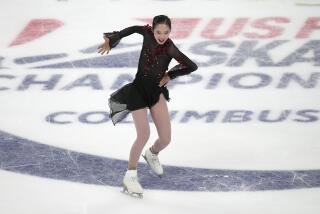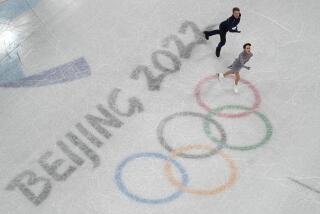Fame is a two-way street for Meissner
There remains a childlike innocence about Kimmie Meissner, reflected in everything from how she wants to be known, to the two-syllable giggle that punctuates many of her sentences, to her reluctance over eventually leaving home in north suburban Baltimore for a college only 45 miles away.
Her given name is Kimberly but she still goes by Kimmie, even if she is a 17-year-old high school senior, a young woman with a street named after her.
She may sound perpetually giggly, but she is serious enough to have used her new celebrity to help young cancer patients at two Baltimore hospitals. She may have traveled the world since age 13, competing in Slovenia, Bulgaria, France, Japan and Italy, but she is unashamedly more homebody than globetrotting adventurer.
The sudden change in image that occurred at the world championships in March, when she went from a lady in waiting to figure skating’s leading lady, has affected how others see Meissner but not how she sees herself.
“I hope I’m handling it all right,” Meissner said.
For the second time in her still-budding career, she unexpectedly has a lot to handle.
As the new season formally began Thursday in Hartford, Conn., with Skate America, first event in the Grand Prix series, world champion Meissner is indisputably the top U.S. woman.
Also at Skate America is Meissner’s primary international challenger, reigning Grand Prix champion Mao Asada, 16, of Japan, who was too young to compete at the 2006 Olympics or worlds.
This is the first post-Olympic season since 1988 that none of the reigning women’s Olympic medalists -- Shizuka Arakawa of Japan, 2006 U.S. champion Sasha Cohen and Irina Slutskaya of Russia -- plan to compete. It also is the first season since 1996 that Michelle Kwan, retired except for the official announcement, is not the biggest name in competitive skating.
“It has been great to have the kind of thought going around that I’m the best in U.S. figure skating,” Meissner said. “It’s a great honor and a pretty big responsibility, but I’m glad I have the chance to see how it works.”
Meissner had struggled for nearly a year to match the great expectations created by her performance at the 2005 national championships, her first at the senior level. She not only finished third but also became the second U.S. woman to land a triple-axel jump, still a compelling achievement for female skaters.
“Last season we kind of didn’t know where she was going to fit into the mix,” said Pam Gregory, Meissner’s coach. “It was her first Grand Prix season, and we knew she had the [technical] elements, but we didn’t know how she would be received.”
The answer? So-so. Meissner had a pair of fifth-place finishes in her Grand Prix events.
By the 2006 nationals, however, Meissner had regained her anticipated performance level. Probably, only a botched double axel 10 seconds from the end of the free skate kept her from beating Cohen for the title.
Meissner was a solid sixth at the Olympics and clearly figured to be a medal contender at worlds. When Cohen, as usual, gave everyone an opening with a painfully underwhelming free skate, Meissner zipped through it, earning the third-highest long program score in skating’s 4-year-old points system.
Meissner understands that performance shifted the focus on her. Some already project her as the 2010 Olympic champion.
“We just have to keep the focus on what Kimmie does, not what other skaters are doing or what is expected of her,” Gregory said.
The good things about being skating’s new star include traveling on Kimmie Meissner Way, having a hometown parade in her honor, throwing out the first ball at a Philadelphia Phillies game and, most important to Meissner, being involved in the Cool Kids’ program for pediatric oncology patients.
She helped design bracelets to raise money so children coming for treatment and their families would get packages with such items as parking and food vouchers, a GameBoy or iPod. She also entertained many of the children at a skating party.
“I would probably never have been able to do that unless I sort of had a name,” Meissner said.
*
Taking advantage of a weak field, Californians Rena Inoue and John Baldwin are in position to win their first Grand Prix event after finishing first in Thursday night’s short program at Skate America. The reigning U.S. pairs champions made mistakes on their first two elements yet outscored another U.S. team, Naomi Nari Nam and Themi Leftheris, by nearly two points.
In the men’s event, two-time world bronze medalist Evan Lysacek of Los Angeles skated an imperfect but perfectly competent short program and still found himself third behind Japan’s Nobunari Oda and France’s Alban Preaubert.
Philip Hersh covers the Olympics for The Times and the Chicago Tribune.
More to Read
Go beyond the scoreboard
Get the latest on L.A.'s teams in the daily Sports Report newsletter.
You may occasionally receive promotional content from the Los Angeles Times.






